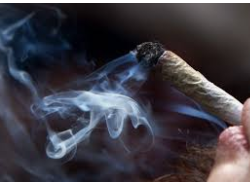
When teens start smoking marijuana at a young age, it can cause damage to their brains as they’re developing and can cause mental and emotional problems as they get older. Now a report on NBC News is looking at the link between teen pot smoking, and whether it could lead to depression as teens grow older.
The Potential Long Term Mental Damage With Pot Smoking
As NBC reported, a new study states that when teens and younger adolescents smoke marijuana, it could increase the risk of depression and suicidal thoughts as they get older. This study was published by JAMA Psychiatry, and researchers made a disturbing find that there was a 40% increase in people risking serious depression and a 50% jump in suicidal thoughts from smoking marijuana when they’re younger.
As one doctor explained, “given the large number of adolescents who smoke cannabis, the risk in the population becomes very big.” When you do the math, the statistics can get scary. “About 7 percent of depression is probably linked to the use of cannabis in adolescence, which translates into more than 400,000.”
Current Teen Marijuana Stats
NBC also reports that right now cannabis use is still high among teenagers. Starting as early as junior high, 14% of eighth graders have admitted to using cannabis “at some point in their lives,” with 32% of 10th graders admitting to cannabis use, and 43% of 12th graders coping to it as well. (These stats were taken from over 23,000 teens and adolescents polled.)
By going through the research and statistics, this study found that for people who smoked marijuana before they turned eighteen, they could be 1.4 times more likely to be at risk for depression, and could 1.5 times more likely to have suicidal thoughts. (Not to mention these teens could end up being 3.46 times more likely to try suicide when they’re adults than teens who don’t indulge in marijuana.)
Looking at Marijuana and Teen Depression
Right now there is indeed tremendous popularity with teens and marijuana, as well as teens and vaping. So many feel that both are relatively harmless, especially with marijuana becoming legalized around the country and vaping being the hot trend among teens, but that’s not so.
The people behind this study are hoping it will provide a warning to people that aren’t aware of the harmful effects of marijuana, especially with adolescents whose brains are still developing. One psychiatrist called the adolescent brain “under construction” until they reach their early twenties. “We already know that [cannabis] can impair attention, learning, and memory.”
The fact that cannabis can now also be a factor in depression and suicidal thoughts is another great cause for concern, and once again proves that cannabis is far from harmless.
Yet at the same time, this also gives a signpost for doctors and psychiatrists to look out for with adolescents and young adults. Many teens who smoke cannabis also have other issues, and this could be a flag to many healthcare professionals that a young adult needs help.

Mendi is a passionate advocate for teens and adults in the mental health and addiction arenas. Mendi envisions and creates programs bringing a unique approach to mental health and substance use treatment.
Clinically trained, Mendi earned a BA with honors in psychology and social work at the University of Maryland and an MSW at the University of Maryland School of Social Work. His extensive experience as a therapist includes individual and group psychotherapy for children, adolescents, adults and families in various settings.
Mendi has gained insight and experience from his work at several treatment centers, which include the Chesapeake Center for Youth Development, the Carroll County Youth Services Bureau, Chabad Crisis Centers and the Center for Discovery and Adolescent Changes.
Prior to launching Hope Street, Mendi conceived and built multiple successful, high end adolescent and adult residential facilities and outpatient programs that include Ignite Teen Treatment, Eden Treatment and Elemental Treatment.
Mendi has appeared on the Dr. Phil show, is regularly featured in mental health and addiction publications and speaks around the country in person, on TV and on Radio shows on these topics.
With his newest ventures, Mendi instills a unique blend of energy, creativity and expertise to the treatment of teens, adults and their families dealing with trauma, addiction and mental health issues.
The son of a Rabbi and eldest of 11 children, Mendi is a part-time rock musician, boxer, cantor and father of four.
